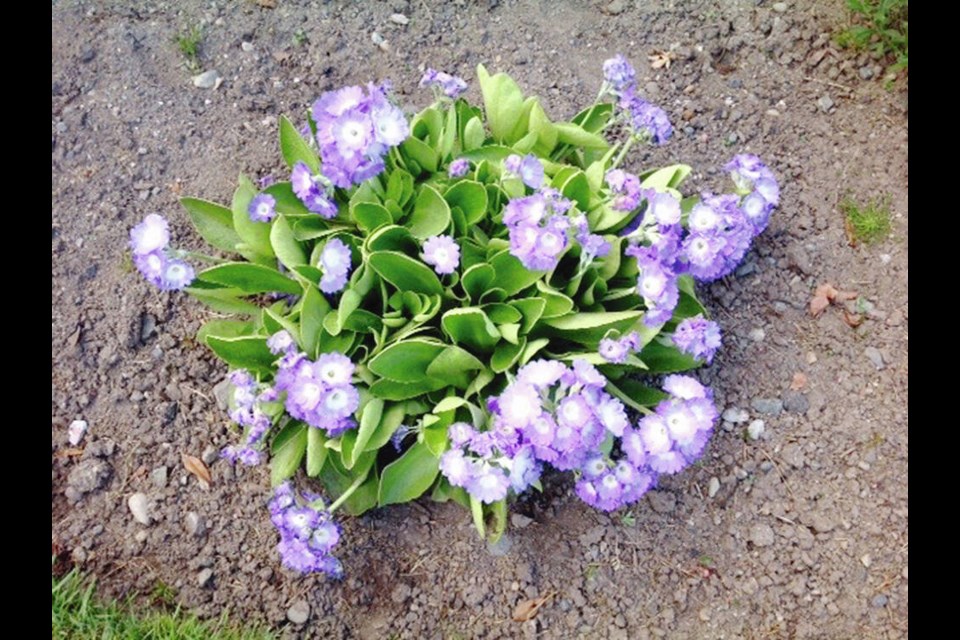Around a month ago I began to notice a bright splash of golden colour in a raised planter across the street. The planter, located on the boulevard where the neighbours’ driveway meets the road, houses a pampas grass, with two clumps of the yellow-flowered perennials in front.
Taking a close look at the plants, I saw they were Doronicum, a perennial commonly called Leopard’s Bane. The plants bear large, yellow, daisy type flowers in April and May. For some reason, Doronicum is not seen widely in gardens here.
The next time I was in a garden centre, I found a display of Doronicum in two forms, the standard one growing 45 to 60 cm tall, and ‘Little Leo’ — a compact (30-cm) strain. I bought a Little Leo to plant at an edge of the front lawn where two dwarf apple trees grow.
Undervalued plants. Soon after my Doronicum encounter I had an email from Margaret, who was wondering why two of her favourite plants are seldom seen in Victoria area gardens. One of them was Leopard’s Bane.
“I have been growing and propagating Leopard’s Bane and Auricula primulas for many years now. I try to encourage people to grow them as they are so beautiful and they bloom in early spring.
“I don’t know why Auriculas are not readily available here, but this year I did see them in one nursery. The flowers are so pretty, and they bloom for quite a while, especially in this cool weather. Auriculas are perfect plants for containers. I’ve had them grow, bloom, and stay handsome in 15-cm wide clay pots for more than four years.”
Leopard’s Bane. This odd common name for Doronicum apparently emerged from people once believing the plant was poisonous to animals. It does have the reputation of being resistant to bunny nibbling and deer browsing.
I thought I might have found a reason for seeing Doronicum seldom in gardens when one of my references noted that the plants are prone to going dormant in high summer heat. But Margaret says her plants have not gone dormant, even in last summer’s heat. “I cut them right down after they bloom and they become lovely green plants all summer.”
Primula auricula. These very hardy but elusive primroses thrive in Prairie gardens but have a reputation for being difficult in wet-winter regions like ours.
Margaret disputes this: “I grow Auriculas in the open garden as well as in pots. The in-ground ones have been just fine, even in the past wet winter.”
The auriculas have smooth, fleshy leaves and March to May flowers in a wide range of colours, each with a contrasting eye. The plants were very popular in Victorian England. Hundreds of named varieties were grown then. Now they are usually available only in mixtures.
With plants difficult to find, I became interested in locating a new Primula auricula seed source, since they are no longer available from sources I once knew of.
An online seed source search unearthed an Auricula specialist in France — Barnhaven Primroses. Their online catalogue displays a dazzling array of varieties. Click on “Alpine primula” and then on “Auricula seed” in the left hand directory. They ship seeds to Canada.
GARDEN EVENTS
Qualicum meeting. The Qualicum Beach Garden Club will meet on Monday at 7:30 p.m. in the QB Civic Centre, 747 Jones St. Doors open at 7. Laurene Ebbett will present a slide show on the public and private gardens of France and England, and of the Chelsea Flower Show. Current Covid protocols in place.
Invitation to exhibit. The Mill Bay Garden Club is extending to the gardening public an invitation to exhibit at their Flower and Garden Show on Saturday, May 28. Anyone interested can pick up an Exhibitors’ Guide at Thrifty Foods in Mill Bay, Country Grocer in Cobble Hill, or Buckerfield’s, Dinter Nursery, Shar Care and The Old Farm Market in Duncan. Or download the guide at .
Art in the garden. Abkhazi Garden, 1964 Fairfield Rd. in Victoria, will feature local artists in the garden from May through September, with an outdoor art show on Sept. 5.
Denman tour. The Denman Island Home and Garden Tour is back, on June 11 and 12. “Earlybird” tickets are available for $20, up to May 15. Details and ticket purchase at . Click on Home & Garden Tour.


